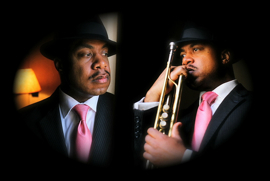
Sunday, 3:00 PM
at McAllister Auditorium, on the campus of
San Antonio College, 1300 San Pedro
Plenty of free parking.
Box Office opens 2:00 PM.
Seating at 2:40 PM.
Since 1994 when Nicholas Payton made his recording debut as a leader, the trumpeter has been lauded as a significant, top-tier voice in jazz. Even though he started out as a “young lion of jazz,” heralded as one of the new-generation guardians of the hard bop flame, Payton consistently committed himself to discovering his voice outside of the strict confines of that rearview mirror approach to the music.
Payton was born into a musical family (he remembers sitting under the piano while his bassist father Walter rehearsed with his band). Having been mentored by two Crescent City jazz masters (Clyde Kerr Jr. at the New Orleans Center for Creative Arts and Ellis Marsalis at the University of New Orleans), Payton was well-prepared to leap into the jazz fray when he emerged on the New York scene in the early 1990s. He impressed fellow New Orleans native and Jazz at Lincoln Center Artistic Director, Wynton Marsalis, and was a regular in the early years of programming there. Over the next several years, Payton continued to hone his craft working with such jazz legends as Doc Cheatham—on a Grammy Award-winning 1997 eponymous duo album—Hank Jones, Elvin Jones, Marcus Roberts, and Ray Brown.
In 2003 he boldly moved beyond the straight-ahead. He shocked the jazz world with an adventurous CD that infused elements of hip-hop, electronica, and effects-driven trumpeting. “I wanted to make a shift to the other extreme,” Payton says.
In 2008, Payton became part of The Blue Note 7, a septet formed that year in honor of the 70th anniversary of Blue Note Records.
While his jazz journey has taken him down many roads—from heritage artist to electric experimenter—the 36-year-old trumpeter has arrived at a new plateau of jazz maturity in 2010. Payton says “The true staples of jazz for me—the hallmarks of the music throughout its history—are love songs and the element of dance.”
“… I’m coming to terms with who I am. I’ve weeded out those things that don’t feel right for me. I’m not out to try to impress and I’m not worried that what I play is going to upset some people. I want to write and play music that speaks for me and means something to me, that I feel passionate about.”
Grooves are central. “I was writing a lot from a groove first before melody,” Payton explains. “I was writing conga parts, real specific parts written out. I wanted that dance element that was there at the roots of jazz. I feel a lot of jazz has gotten away from that legacy.” He adds, “Whereas experimentation has its advantages, some things should always remain the same.”
The Nicholas Payton SeXXXtet is: Johnaye Filelle Kendrick, voice, Lawrence Elliot Fields, piano, Robert Hurst, bass, Rolando Guerro, conga/percussion, Karriem Rigins, drums, and Nicholas Payton, trumpet.
